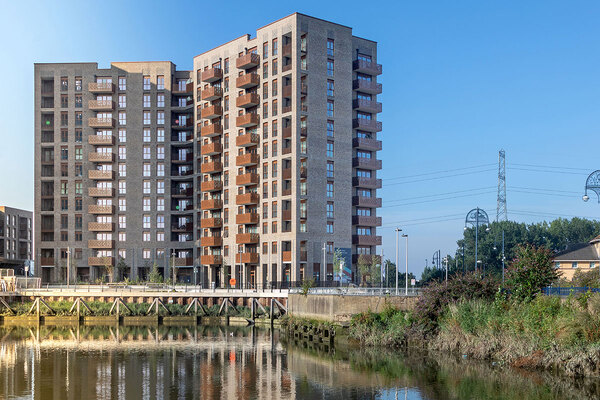You are viewing 1 of your 1 free articles
Boris Johnson should train his sights on volume builders
Government needs to help housing associations challenge the dominance of volume builders if we are to improve affordability and create better places to live, writes Brian Cronin
Five years ago, Boris Johnson waved a brick around at Conservative Party conference to demonstrate his commitment to building new homes in London. During his time as London mayor, he also broadened the definition of affordable housing and reduced the target for affordable housing.
Now he is in Number 10, it shouldn’t be long until we get a feel for how committed the new prime minister is to building affordable housing across the UK.
There have already been early reports that Mr Johnson is weighing up a new part-rent, part-buy housing tenure.
But if he really wants to tackle the housing crisis and help people on modest incomes, then Mr Johnson and his team should also train their sights on the big volume builders that dominate the UK housing market.
Not only are these firms failing to deliver enough affordable stock, but they are also failing to deliver it where it is most needed.
A new approach is needed and the first challenge is to get to the bottom of where exactly we need more new homes to be developed that meet the needs of the majority of people on modest earnings. This is why at Your Housing Group we have created a new measure of ‘liveability’ – combining the availability of affordable housing with multiple factors that capture the quality of life and opportunity available for average earners.
We recently launched our new ‘liveability index’ in Westminster at an event with shadow housing minister Alex Cunningham. It covers the whole of England, with Harborough taking the top spot as the most ‘liveable’ local authority in England and Hackney emerging as the least liveable local authority.
Harborough offers good housing affordability, excellent opportunity and good desirability for people living there. Although the house prices of £315,400 in Harborough are slightly above the national average, the average monthly rent is well below at £747.
At the bottom end of the table, Hackney, which might be good for a fun night out, is the least liveable local authority in England. A house there will cost an average £619,000 while the average monthly rent is £1,856, both more than double the national average. Average resident earnings of £34,000 are slightly above the national average but not sufficiently so to compensate for the much higher cost of owning or renting.
“The big divide in living standards that the report exposes is a result of the private sector’s failure to build enough affordable homes in the right places”
Overall our index shows that London is unaffordable and with an average quality of life offer, while the North is affordable with a below average quality of life offer. The Midlands appears to offer the best mix of affordability on the one hand and quality of life on the other.
The big divide in living standards that the report exposes is a result of the private sector’s failure to build enough affordable homes in the right places. To address this, national housebuilding targets should be supported by regional targets, which include the proportion of affordable housing needed. There should also be a new analysis of where affordable housing most urgently needs to be developed. Mr Johnson’s team may wish to look at the insights produced by the liveability index guiding this mapping.
The overriding and fundamental issue, however, is simply the inability of the present market of housing developers to meet any of this challenge, which needs urgent and concerted action from government.
The fundamental issue is that the housing market is overly dependent on a handful of private sector builders which are largely building homes at prices that are unattainable. Soaring house prices and the lack of affordable homes are thus driving people into the private rented sector, where quality is variable and tenancies are not reflective of renters’ needs.
“The fundamental issue is that the housing market is overly dependent on a handful of private sector builders which are largely building homes at prices that are unattainable”
The only way to break this toxic cycle is to challenge the market failure that underpins it, which is creating a real and growing social problem. It means urgent intervention from government is needed to encourage a wider scope of alternative developers, whose motives are different to the so-called ‘big six’ volume builders which dominate housing provision.
Housing associations have a proven track record for delivering homes at tenures and price points to suit people on more modest and average incomes. Giving housing associations an increased role in Britain’s housing market could set the foundations for making every area in the UK ‘liveable’ for those on modest incomes.
Brian Cronin, chief executive, Your Housing Group
Future of Work Festival
New for 2019, Inside Housing’s Future of Work Festival will bring together HR and organisational development professionals from the housing sector to discuss and explore the challenges of how to successfully evolve towards the working environment of the future.
Seize this opportunity to rethink your workforces and workplaces by reconsidering the roles of individuals, organisations, automation technology and how society will approach work.
Assess and benchmark your business strategy with the leaders in the housing sector:
- Defining the Future of Work: what does it look like, what will be the implications, how do you rethink your workforce strategy?
- How to embed Electronic Data Interchange into your workforce, attract the widest pool of talent, be authentic and innovative, keep your workforce happy and productive, and position your brand
- Identifying, assessing and closing the skill gaps: what skills will be required in the future and how do you prepare for the undefined?
- Appealing to and maintaining a multi-generational workforce: how to address differing career aspirations, expectations, behaviours and values
- How best to implement the best tech, for example, big data, artificial intelligence, automation, blockchain and the Internet of Things. How will this change workplace skills and wages? How do you evolve towards a ‘STEMpathetic’ workforce?
- Providing your HR and OD department with the right skills and toolkits to revise talent, organisational structures and business models. Be social and environmentally friendly, and data driven – investing in disruptive tech, skills training and ethical use of tech
- Promoting well-being and employee experience
- Introducing training and learning as part of the career path
- Embracing agile working – understanding how flexible and alternative working arrangements can boost productivity
The festival will take place on 17 September, at Westminster Bridge, County Hall in London.














